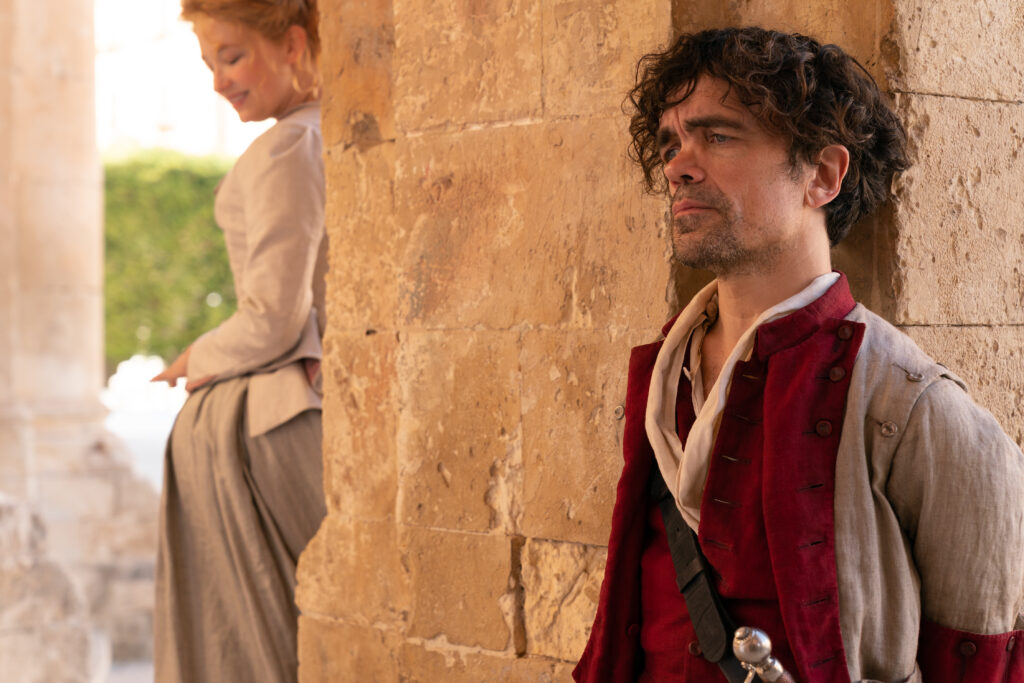
In the eighth-season finale of Seinfeld, Jerry and George are again bemoaning their inability to sustain a functioning relationship when the latter seizes on the concept of a “relationship intern”—a way of combining forces and channeling them into a single partnership. “Maybe the two of us, working together at full capacity, could do the job of one normal man,” George hypothesizes. This is a very funny conceit that also bears more than a cursory resemblance to the plot of Cyrano de Bergerac, the Edmond Rostand play in which a disfigured poet invisibly assists a dimwitted beefcake in his pursuit of a beautiful woman. Showing us a hero, Rostand wrote us a tragedy, but the comedy inherent in his premise has proved irresistible for American studios, which time and again—in the 1987 Steve Martin vehicle Roxanne, in the poorly regarded 2000 teen flick Whatever It Takes, in the tender 2020 queer romance The Half of It—have sweetened the original’s heartbreak with dollops of reassuring syrup. Among its many achievements, Joe Wright’s new big-screen adaptation, simply titled Cyrano, honors its progenitor’s abiding despair. It’s a movie full of big, bold emotions—lust and love, anger and hunger, jealousy and solidarity—but most of all, it is profoundly sad.
This isn’t to say that the picture is unduly dour or moribund. To the contrary, Wright has leveraged his considerable technical skill—alongside the contributions of his customarily skilled retinue of artisans—to create a spry and dynamic production, one that retains the essence of Rostand’s text while also updating it with lush cinematic vigor. This isn’t simply a matter of prettifying the screen, though the costumes and wigs (by Massimo Cantini Parrini and Jacqueline Durran) are appropriately fabulous, while Sarah Greenwood’s striking production design imbues the film with a bold degree of theatricality. Special mention must be made of Seamus McGarvey’s cinematography, which combines light and shadow in intoxicating ways; certain dusky scenes possess an ethereal glow as though the actors are being illuminated less by a lighting rig than by the moon. Yet the most obvious change from the stage version is structural: This Cyrano is a musical.
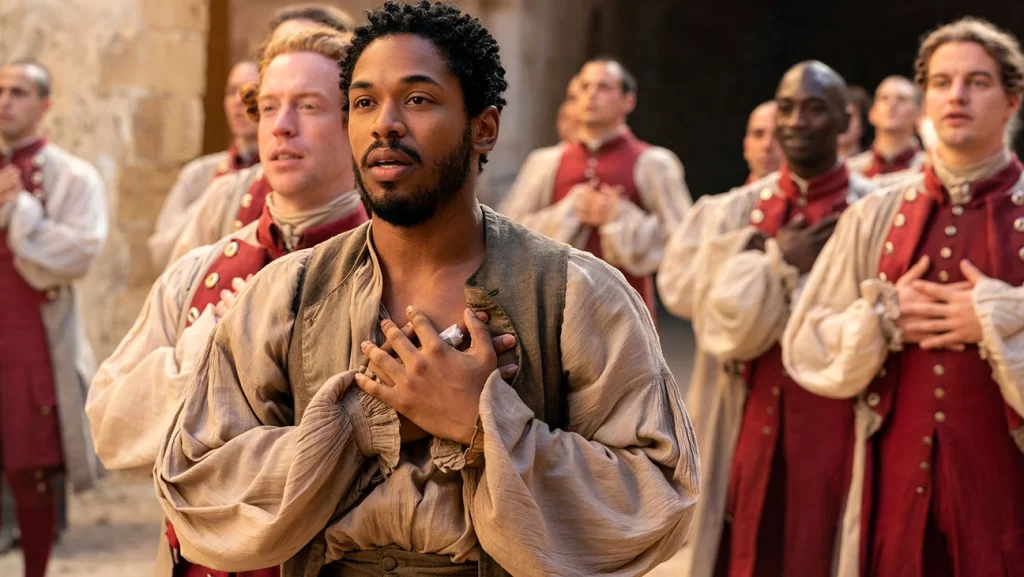
Specifically, it’s an update of Erica Schmidt’s off-Broadway production, which featured music by The National’s Bryce and Aaron Dessner, who have returned here to provide the score. The notion of characters belting out their feelings in melodic form is hardly revolutionary, not least in 2021 (technically the year of this film’s release), which represented a veritable boom for the movie musical; in addition to the traditional thrills of West Side Story and In the Heights, there were the playful charms of Encanto, the peculiar misadventures of Annette, and the origin-story pleasures of Tick Tick Boom. Cyrano is naturally of a piece with these pictures—it regularly interrupts its more prosaic dialogue scenes with bursts of fantastical song and dance—but it’s also something of an oddity in the way it exploits its own artifice. Whereas most musicals use their numbers to invest their characters’ emotions with exaggerated force—a triumphant ballad, an anguished dirge, etc.—Cyrano’s process is more internal. It wields the power of music not to amplify but to burrow—tunneling inward in order to emphasize its central theme of repression.
The small-T tragedy of Cyrano de Bergerac—depicted here not as a man with an abnormally large nose but as one with an unusually small build, and played by the great Peter Dinklage—is that he’s a prodigious wordsmith yet is paralyzed from giving his own words voice. Wright and Schmidt harness that paradox by wreathing many of the film’s songs in choked longing and solemn regret, prioritizing sincerity over exuberance. Few of them could be characterized as bangers, but they exhibit a directness that’s both literally and metaphorically legible, with plainspoken lyrics that are elegant in their simplicity. The flagship number is probably “Madly”, a curt lament in which Cyrano plaintively asks, “Have you ever wanted something so badly you cannot breathe / Have you ever loved someone madly?” The questions are rhetorical; who hasn’t felt such elemental yearning, and the misery that accompanies its lack of reciprocation?
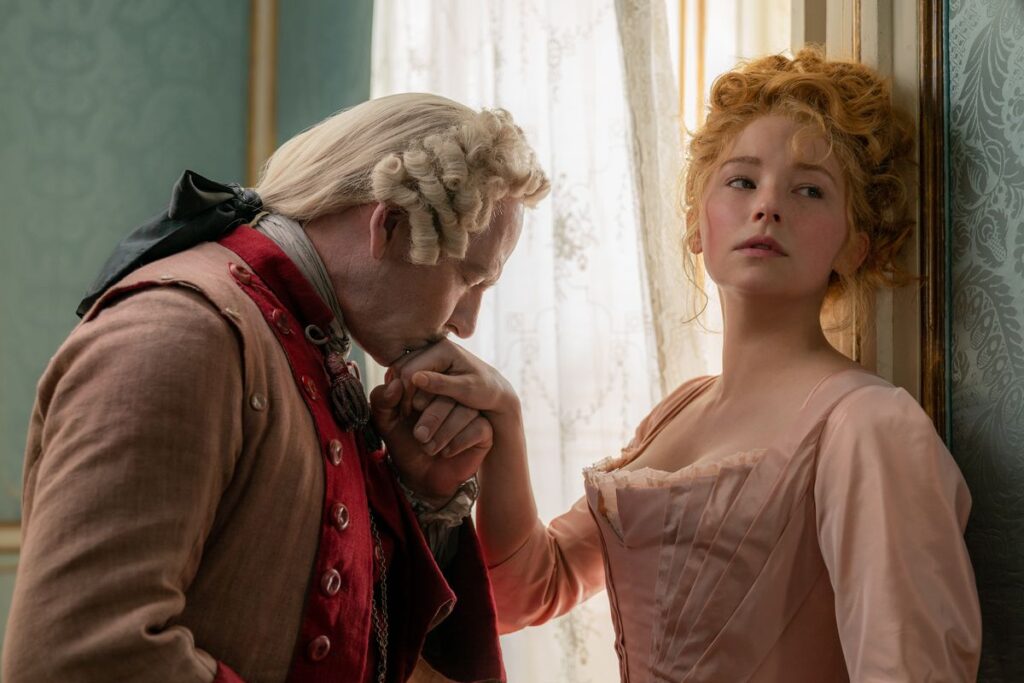
About which: The plot of Cyrano will be predictable to anyone familiar with Rostand’s work, or any of its countless pop-culture iterations, or really even any romantic comedy. Cyrano, a gifted swordsman as well as a silver-tongued poet, has long carried a torch for Roxanne (Haley Bennett), a local looker who views him as a loyal friend rather than a potential partner. She’s busy dodging the attentions of the sneering duke De Guiche (Ben Mendelsohn, ideally cast), Cyrano’s military superior who is pursuing her with a mixture of persistence, impatience, and annoyance. (In a clever touch, Roxanne accepts De Guiche’s invitation to a play but insists on wearing a green dress rather than the red gown he bought her, an act of quiet defiance that flares his anger at failing to possess her; it also recalls a certain other green dress worn by a certain other actress in a certain other Wright picture.) An agreeable alternative emerges in the form of Christian (Kelvin Harrison Jr.), a neophyte soldier and fresh-faced dreamboat who locks eyes with Roxanne at the theater and sets both of their hearts aflutter. If only this gorgeous specimen could also brandish the rapier wit of a certain dwarf…
Cyrano lands its first gut punch early, when Roxanne summons the title character for an urgent meeting, ballooning his hopes only to deflate them when she confesses her boisterous newfound passion for Christian. It’s one of those classically contrived rom-com moments, but when you watch Dinklage’s face, there’s nothing silly or clichéd about it; he imperceptibly registers the news like it’s a gunshot, and though his muscles scarcely move, you can hear his heart breaking. That sense of clenched agony—of suffering an invisible wound that can’t be cured or even acknowledged—defines the movie, and Dinklage taps into a reservoir of silent pain and smothered desire. Cyrano is far from perfect—when we first meet him, he’s rather cruelly dressing down an overly flamboyant thespian—but his haughty condescension swirls alongside his brittle self-doubt, and Dinklage’s emotional vulnerability makes this classic literary hero truly tragic.
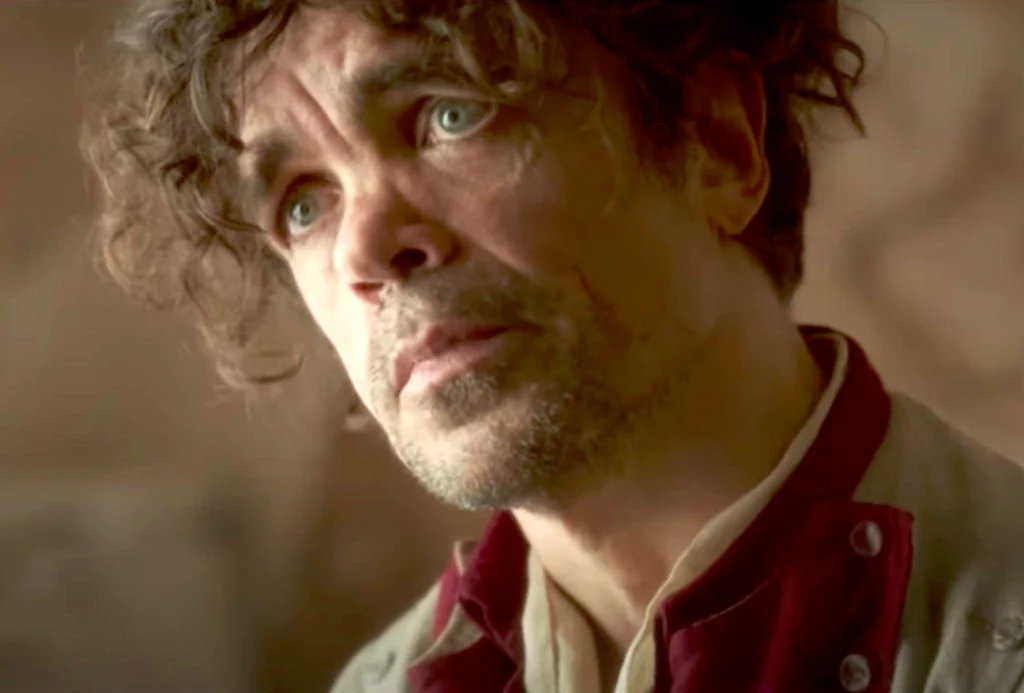
Yet while Cyrano may be etched in sorrow, it is far from gloomy, instead bestowing pleasures both narrative and visual. The crux of the story—in which Cyrano agrees to serve as Christian’s secret mouthpiece, allowing the former to vicariously express his affection for Roxanne through falsely attributed letters even as he guides his new charge through the complexities of courtship—is rife with opportunities for farce, and while Wright is a strenuously serious filmmaker, he isn’t above being playful. (Still, even comic bits of dialogue carry a bitter sting; when Cyrano informs Christian that the particular word he’s searching for is “inarticulate”, it doubles as a reminder that Cyrano himself is incapable of declaring his feelings, rendering him the most articulately inarticulate man in the world.) Wright also remains a bravura stylist, and while his musical choreography is more sturdy than stunning, he routinely supplies images of breathtaking beauty, never more so than during “Every Letter”, a ravishing epistolary trio in which the three leads proclaim their individual cravings while magically sharing the screen. He even establishes Cyrano’s swashbuckling bona fides via a brisk single-take fight sequence that recalls the kinetic thrills he brought to the underrated Hanna.
And though the movie is philosophically opposed to catharsis, its music is nonetheless enveloping and beguiling. The Dessners’ score is heavy on lightness—it relies mostly on a delicate combination of piano, flute, and strings—but it still develops a persistent, earworming rhythm. (When De Guiche receives his own sinister anthem, the guitars come out like knives.) Dinklage possesses a remarkably deep voice that suggests a spiritual kinship with The National’s own Matt Berninger, and his rumbled timbre contrasts nicely with Bennett’s soaring soprano; “Overcome,” their delightful Shakespeare-tinged duet that takes place on and below Roxanne’s balcony (with Cyrano impersonating Christian from the shadows), is achingly asymmetrical, as her cresting joy merges with his crushing sadness. And at one point, Wright shifts away from the main characters and affords a haunting number to three wistful soldiers (one played by Once’s Glen Hansard), each delivering preemptive farewells to their loved ones before marching to their doom.
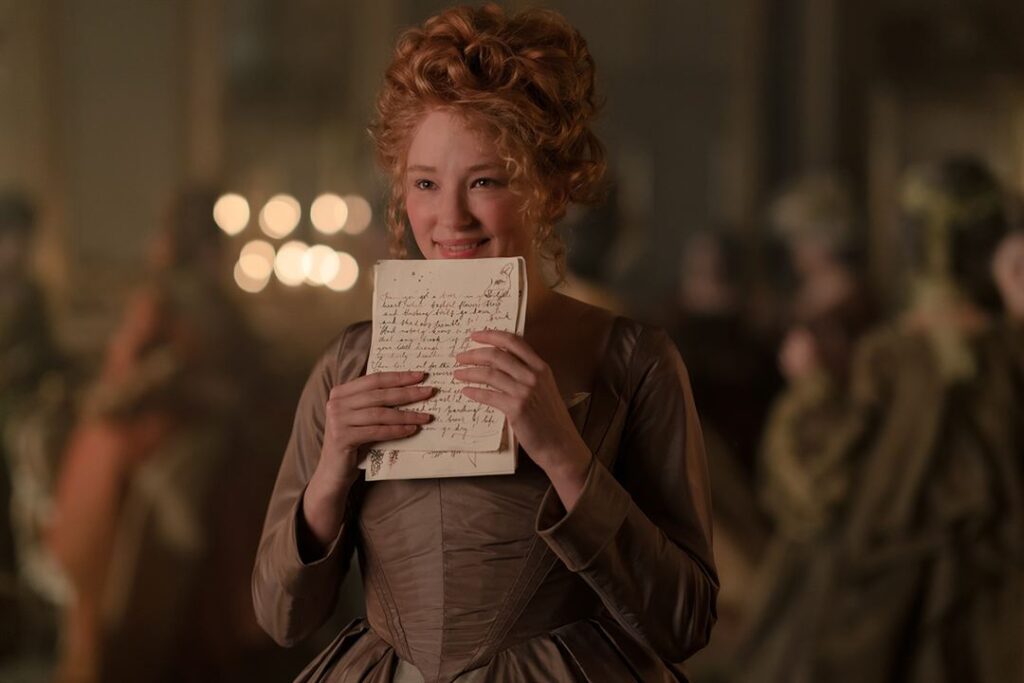
That last song, which unfolds with minimal ceremony and maximal intensity, arrives during Cyrano’s strange third act, when it improbably transitions from melodrama to war movie. These scenes, which find men stationed in a cave and Cyrano fearlessly evading enemy troops, aren’t especially credible in any traditional sense. But traditional credibility isn’t the goal of Cyrano; it’s more concerned with mapping currents of feeling, and these grave military scenes lend its despondent tone even greater potency. The single tear that stains one last letter may as well be a tidal wave.
Midway through Cyrano, Christian finally speaks with Roxanne without his romance whisperer feeding him lines; when he repeatedly tells her he loves her, she encourages him to elaborate, to which he panically responds, “I love you so much!” The banality of his reply incenses her—and inspires her to launch into “I Need More”, a faintly conventional empowerment ballad that nevertheless cements Roxanne as an autonomous woman with agency rather than a mere object of male desire—yet in this particular instance, I’m compelled to take Christian’s side. At a certain point, words lose their meaning. Eventually, you just need to say to a movie, “I love you,” and leave it at that.
Grade: A-
Jeremy Beck is the editor-in-chief of MovieManifesto. He watches more movies and television than he probably should.
